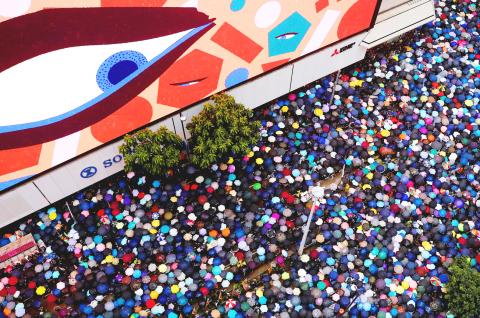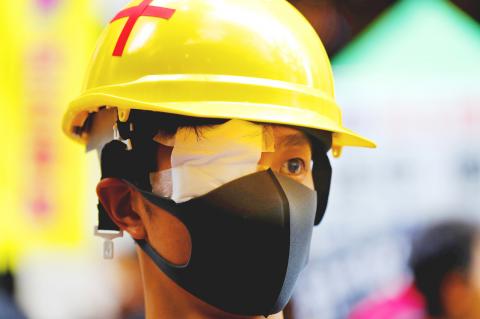Heavy rain fell on tens of thousands of umbrella-toting protesters yesterday as they marched from a packed park and filled a major road in Hong Kong, where mass pro-democracy demonstrations have become a regular weekend activity this summer.
Organizers said they hoped that the assembly would be peaceful, which would make for a rare calm weekend in a months-long movement that has been marked by violent clashes with police.
Law enforcement officers were keeping a low profile, with no riot police seen from the procession’s main routes.

Photo: Reuters
“We hope that there will not be any chaotic situations today [yesterday],” organizer Bonnie Leung (梁穎敏) said. “We hope we can show the world that Hong Kong people can be totally peaceful.”
Leung’s group, the Civil Human Rights Front, has organized three massive marches in Hong Kong since June.
However, the protest movement has been increasingly marked by clashes with police as demonstrators vent their frustrations over what they perceive to be the Hong Kong government’s blatant refusal to respond to their demands.

Photo: AP
“Peace is the No. 1 priority today,” said Kiki Ma, a 28-year-old accountant participating in the march. “We want to show that we aren’t like the government.”
While police had granted approval for the rally, they did not approve an accompanying march.
Demonstrators nevertheless fanned out and filled the streets, as there was not enough space at the designated assembly area.
Public transit trains did not stop at stations near the assembly because of overcrowding.
Harley Ho, a 20-year-old social work student who attended the rally, said that protesters were undeterred by the rain and would not rest until their demands were met.
“We will stand here, we will take action until they respond to us,” Ho said. “In the rain, our spirit becomes stronger.”
In Beijing, You Wenze (尤文澤), a spokesman for China’s ceremonial legislature, condemned statements from US lawmakers supportive of Hong Kong’s pro-democracy movement.
You called the lawmakers’ comments “a gross violation of the spirit of the rule of law, a blatant double standard and a gross interference in China’s internal affairs.”
He said that Hong Kong’s 7.5 million people and the Chinese population as a whole rejected the actions of a “very small group of violent protesters” as well as “any interference of foreign forces.”
You did not mention any specific lawmaker, but numerous US lawmakers, including US House of Representatives Speaker Nancy Pelosi, have affirmed the US’ commitment to human rights and urged the Hong Kong government to end the standoff.
The US Congress also has the power to pass legislation affecting Hong Kong’s relationship with the US in ways that could further erode the territory’s reputation for stability and rule of law.
That includes the recent reintroduction of the US’ Hong Kong Human Rights and Democracy Act, which would among its other provisions require the US secretary of state to issue an annual certification of Hong Kong’s autonomy to justify special treatment afforded to the territory.
More directly, US President Donald Trump could simply issue an executive order suspending Hong Kong’s special trading status with the US, a move that could have a devastating effect on the local economy at a time when Beijing and Washington are engaged in a trade dispute.
A former British colony, Hong Kong was returned to Beijing in 1997 under the framework of “one country, two systems,” which promised residents certain democratic rights not afforded to people in mainland China.
However, some Hong Kongers have accused the Chinese Communist Party-ruled central government of eroding their freedoms in recent years.
The protest movement’s demands include the resignation of Hong Kong Chief Executive Carrie Lam (林鄭月娥), democratic elections and an independent investigation into police use of force.
Members of China’s paramilitary People’s Armed Police force have been training for days across the border in Shenzhen, including yesterday morning, fueling speculation that they could be sent in to suppress the protests.
The Hong Kong police have said that they are capable of handling the protests.

MORE VISITORS: The Tourism Administration said that it is seeing positive prospects in its efforts to expand the tourism market in North America and Europe Taiwan has been ranked as the cheapest place in the world to travel to this year, based on a list recommended by NerdWallet. The San Francisco-based personal finance company said that Taiwan topped the list of 16 nations it chose for budget travelers because US tourists do not need visas and travelers can easily have a good meal for less than US$10. A bus ride in Taipei costs just under US$0.50, while subway rides start at US$0.60, the firm said, adding that public transportation in Taiwan is easy to navigate. The firm also called Taiwan a “food lover’s paradise,” citing inexpensive breakfast stalls

TRADE: A mandatory declaration of origin for manufactured goods bound for the US is to take effect on May 7 to block China from exploiting Taiwan’s trade channels All products manufactured in Taiwan and exported to the US must include a signed declaration of origin starting on May 7, the Bureau of Foreign Trade announced yesterday. US President Donald Trump on April 2 imposed a 32 percent tariff on imports from Taiwan, but one week later announced a 90-day pause on its implementation. However, a universal 10 percent tariff was immediately applied to most imports from around the world. On April 12, the Trump administration further exempted computers, smartphones and semiconductors from the new tariffs. In response, President William Lai’s (賴清德) administration has introduced a series of countermeasures to support affected

CROSS-STRAIT: The vast majority of Taiwanese support maintaining the ‘status quo,’ while concern is rising about Beijing’s influence operations More than eight out of 10 Taiwanese reject Beijing’s “one country, two systems” framework for cross-strait relations, according to a survey released by the Mainland Affairs Council (MAC) on Thursday. The MAC’s latest quarterly survey found that 84.4 percent of respondents opposed Beijing’s “one country, two systems” formula for handling cross-strait relations — a figure consistent with past polling. Over the past three years, opposition to the framework has remained high, ranging from a low of 83.6 percent in April 2023 to a peak of 89.6 percent in April last year. In the most recent poll, 82.5 percent also rejected China’s

PLUGGING HOLES: The amendments would bring the legislation in line with systems found in other countries such as Japan and the US, Legislator Chen Kuan-ting said Democratic Progressive Party (DPP) Legislator Chen Kuan-ting (陳冠廷) has proposed amending national security legislation amid a spate of espionage cases. Potential gaps in security vetting procedures for personnel with access to sensitive information prompted him to propose the amendments, which would introduce changes to Article 14 of the Classified National Security Information Protection Act (國家機密保護法), Chen said yesterday. The proposal, which aims to enhance interagency vetting procedures and reduce the risk of classified information leaks, would establish a comprehensive security clearance system in Taiwan, he said. The amendment would require character and loyalty checks for civil servants and intelligence personnel prior to